A global problem.
For as long as the healthcare sector has existed, it has faced a global challenge that has consistently affected resource efficiency, patient experience, medical staff productivity and all stakeholders.
As you could imagine, we are talking about missed appointments; an enemy of the industry's development that causes up to 30% of the loss of healthcare institutions' capacity for care every year and that today, in the midst of the technological revolution, is still in force.
This problem affects both physicians and managers in the healthcare sector, as institutions lose more than 30% of their healthcare capacity due to absences. In this article, we will explore the causes behind these absences and how technology can provide effective solutions.
Health facilities lose more than 30% of their capacity to provide care due to absenteeism.
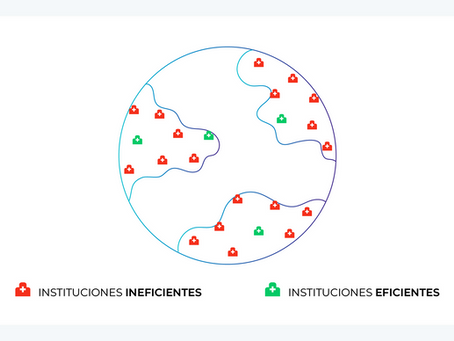
But what is the cause of missed appointments?
Several factors contribute to patient absences from medical appointments, which vary depending on the territory, the level of technology of the health institutions and even the culture of the people.
According to studies, appointments are often missed for the following reasons: 44% of patients forget their appointments, while 15% are unable to attend due to unexpected events. In addition, 4.7% of patients are relieved of their symptoms before the scheduled appointment and smaller percentages do not show up due to various transportation or work leave difficulties.
On the other hand, it is important to note that the more time that elapses between scheduling and attending the appointment, the greater the probability of no-shows.
For example, if the appointment is scheduled less than one week in advance, no-shows can reach 25%. If the appointment is scheduled more than two weeks in advance, this percentage can rise to 45%, and if the appointment is scheduled more than three weeks in advance, no-shows can reach an alarming 53%.
Obviously, some of these causes are very difficult to foresee, but frequently reminding patients of appointments and offering tools for cancellation can be a high-impact solution to this problem.
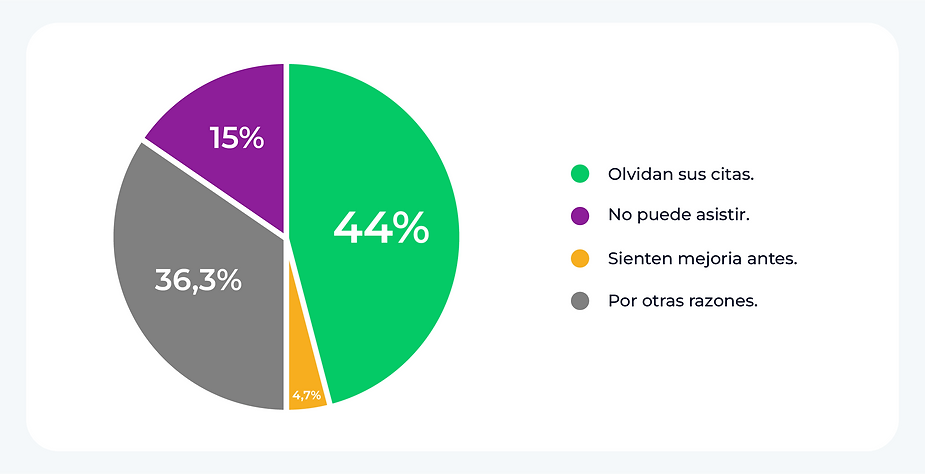
A problem that affects everyone in the value chain.
Missed medical appointments not only harm patients, but also affect the productivity of physicians and the optimization of the operating staff of healthcare institutions, resulting in losses of millions of dollars month after month.
When patients fail to keep their scheduled appointments, resources are wasted and the opportunity to provide timely and appropriate care to other patients in need is lost.
Moreover, this creates an additional burden on physicians and staff, who waste alarming amounts of time having to deal with schedule changes and rearranging their agendas.
Ultimately, the lack of attendance affects both the health of patients and the overall performance of healthcare institutions and their staff.
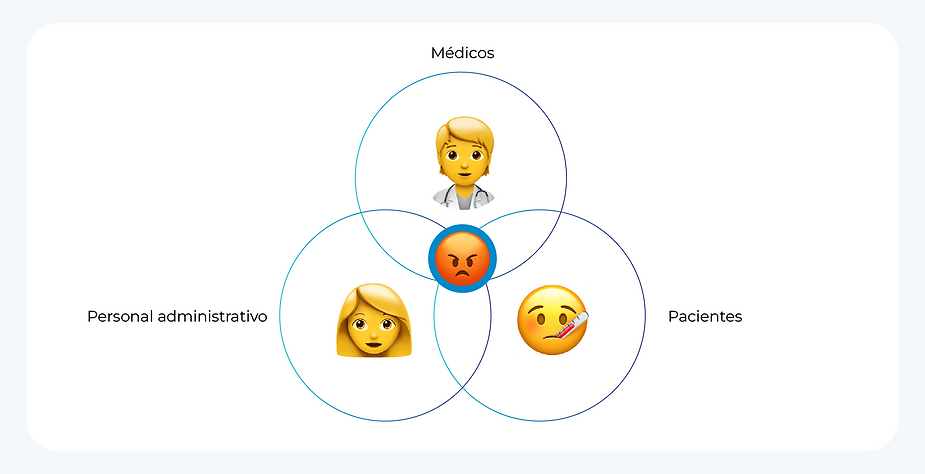
The great barrier to solving this problem.
As is usually the case in any other industry, the change of paradigms and the fear of technological transformation, mostly due to lack of knowledge, is the main barrier that prevents the health sector and its decision makers from taking measures to solve the problem of absenteeism.
Despite the fact that we are in a time of technological revolution worldwide, most healthcare institutions have not adopted technologies to automate processes and digitize their services.
For example, it is estimated that 60% of facilities do not have web portals for scheduling appointments, and 48% limit themselves to using phone calls to remind patients of their appointments, which is not as efficient. These traditional practices hinder effective communication with patients, which is the main cause of no-shows.
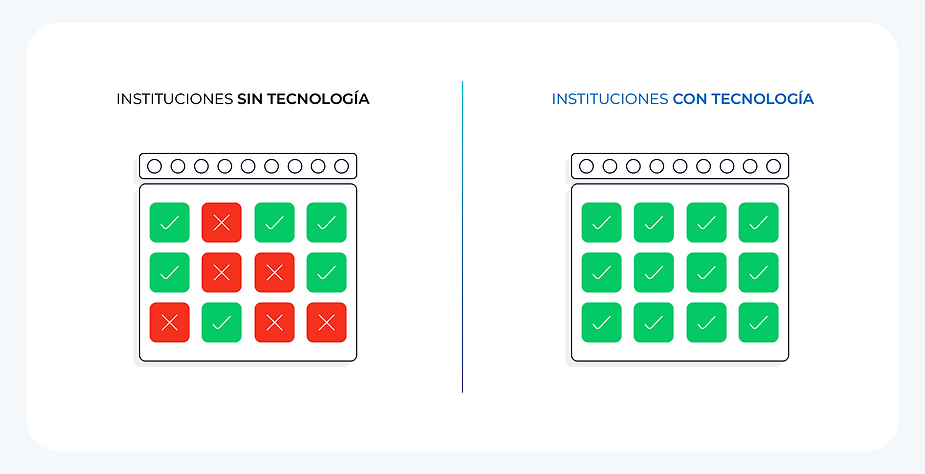
Technology is here to solve this problem.
Healthcare institutions that digitally transform themselves exponentially improve their performance and increase their installed capacity by over 30%.
It is no longer a matter of solutions not existing, but of being implemented. From automated messages and calls that remind patients of appointments, to platforms that allow patients to schedule, confirm and cancel appointments autonomously, to remote care platforms that provide flexibility in medical care, many companies have innovated by creating solutions that drastically reduce the waste of resources for the healthcare system and improve the experience of patients and physicians.
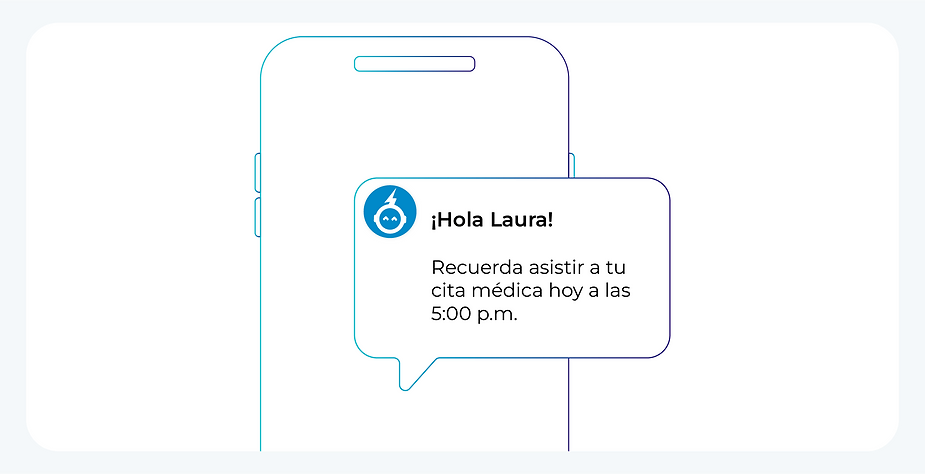
Improving care has a return on investment for healthcare institutions.
It is important to note that improving attendance at medical appointments not only has benefits for patients and physicians in terms of experience and productivity, but also has a positive impact on the annual billing of healthcare institutions.
Reducing at least 5% of no-shows per year can mean an increase of more than US$50,000 in turnover. This is due to optimizing resources, making better use of physicians' time and providing care to a greater number of patients.
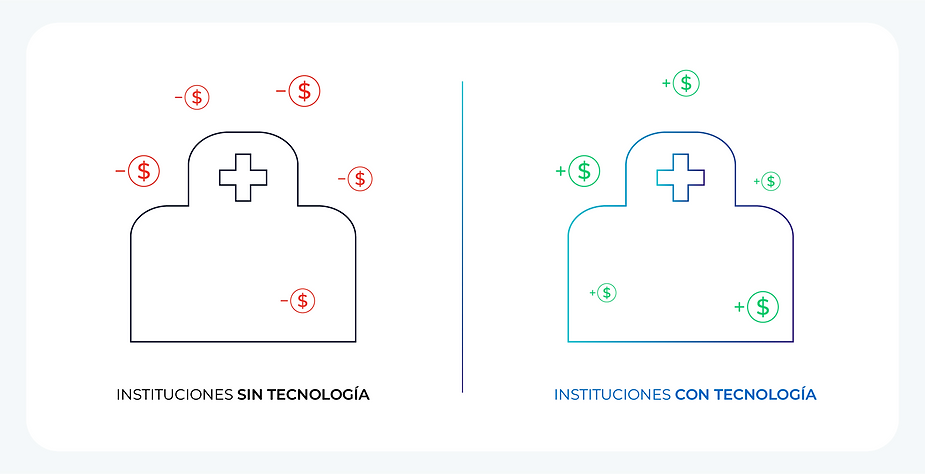
Innovate today to secure tomorrow.
At COCO Technologies, we create solutions that not only solve this problem at its root, but also increase productivity and improve the experience throughout the healthcare value chain; before, during and after care.
Today, more than 300 medical institutions in Latin America have increased their attendance with our technology, and our goal is to take this solution to a global scale so that this problem becomes a thing of the past.
Together we can transform the healthcare system and people's lives.





